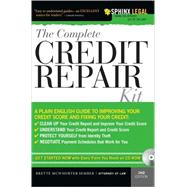
| How to Use the CD-ROM | p. xi |
| Using Self-Help Law Books | p. xv |
| Introduction | p. xxi |
| Assessing Your Situation | p. 1 |
| Debt-The American Way | |
| Dealing with Debt Emergencies | |
| Get a Clear Picture of Your Finances | |
| Understanding Debt | |
| Dealing with Your Emotions | |
| Your Rights | |
| Creditor Tactics | |
| Becoming a Wise Consumer | p. 29 |
| Credit Card Usage | |
| Shopping in Stores | |
| Rebates | |
| Dispute Resolution Programs | |
| Shopping from Catalogs or Online | |
| Refunds | |
| Gift Cards | |
| Resolving Problems with Telephone or Online Merchants | |
| Credit Scores | p. 45 |
| How a Credit Score is Calculated | |
| Why Your Credit Score is Important | |
| How to Get Your Credit Score | |
| How to Improve Your Credit Score | |
| Understanding Your Credit Report | p. 53 |
| Credit Reporting Agencies | |
| Your Credit Report | |
| Reading Your Credit Report | |
| What Makes a Good Credit Report | |
| Changing Your Credit Report | p. 77 |
| Disputing Bills | |
| Correcting Your Credit Report | |
| Disputing After Reinvestigation | |
| Adding Accounts to Your Credit Report | |
| Removing Inquiries | |
| Adding a Statement to Your Credit Report | |
| Suing a Credit Agency | |
| Organizing Your Correspondence | |
| Reducing Your Debt and Improving Cash Flow | p. 93 |
| Prioritizing Your Debts | |
| Dealing with Your Creditors | |
| Dealing with Specific Types of Debt | |
| Student Loans | |
| General Negotiating Tips | |
| Eliminating Debts You Do Not Owe | |
| Negotiating Settlements | |
| Finding Cash | |
| Options to Avoid | |
| Dealing with Judgments and Liens | |
| Closing Your Accounts | |
| Getting Help | p. 127 |
| Where to Turn | |
| Agencies that Can Assist You | |
| Other Credit Repair Agencies | |
| Government Agencies | |
| When to Get a Lawyer | |
| Bankruptcy | |
| Coping with Marriage, Divorce, and Debt | p. 145 |
| Your Credit Rights during Marriage | |
| Divorce is not a Debt Solution | |
| Death of a Spouse | |
| Recognizing Identity Theft | p. 155 |
| Preventing Identity Theft | |
| Dealing with Identity Theft | |
| Looking at the Identity Theft Risk Realistically | |
| Creating a Good Credit Record | p. 183 |
| Understanding Credit Terms | |
| Obtaining New Credit | |
| Improving Current Credit | |
| How to Use Your New Credit Cards | |
| Choosing a Card | |
| Cash Advances | |
| Tracking Your Cards | |
| Obtaining Loans | |
| Bank Accounts | |
| Name and Address Changes | |
| Negotiation with Past Creditors | |
| Scams to Avoid | |
| Reducing Unsolicited Offers for Credit | |
| Budgeting | p. 203 |
| Why You Should Have a Budget | |
| Creating a Budget | |
| Making Changes to Your Budget | |
| Getting Organized | |
| Paying Your Bills | |
| Following Your Budget | |
| Living on a Budget and Using Credit | |
| Facing the Future | p. 213 |
| Changing Your Outlook and Mind-Set about Money | |
| Dealing with Changes | |
| Dealing with Self-Esteem and Compulsion Issues | |
| Educating Children about Debt | |
| Moving Forward | |
| Glossary | p. 219 |
| State-by-State Resources | p. 227 |
| State-by-State Criminal Law Statutes Regarding Identity Theft | p. 251 |
| Forms and Letters | p. 343 |
| Index | p. 417 |
| About the Author | p. 423 |
| Table of Contents provided by Ingram. All Rights Reserved. |
The New copy of this book will include any supplemental materials advertised. Please check the title of the book to determine if it should include any access cards, study guides, lab manuals, CDs, etc.
The Used, Rental and eBook copies of this book are not guaranteed to include any supplemental materials. Typically, only the book itself is included. This is true even if the title states it includes any access cards, study guides, lab manuals, CDs, etc.
Excerpted from The Complete Credit Repair Kit by Brette McWhorter Sember
All rights reserved by the original copyright owners. Excerpts are provided for display purposes only and may not be reproduced, reprinted or distributed without the written permission of the publisher.